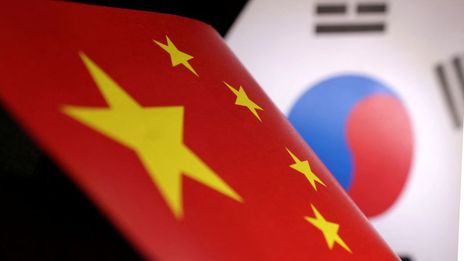BEIJING (Reuters) -China on Tuesday scolded South Korean and Japanese lawmakers for visiting Taiwan despite its strong opposition, chiding both neighbours for attending Taiwan's "so-called inauguration ceremony of the leader".
Taiwan President Lai Ching-te, who won a January election, was officially sworn in on Monday.
China resolutely opposes the visits, its embassies in South Korea and Japan said, and has lodged solemn representations with the two northeast Asian countries.
A spokesperson for the embassy in South Korea said the move runs counter to the China-South Korea strategic cooperative partnership, while to Japan, the embassy there said the visit seriously contravened the spirit of Sino-Japanese commitments.
China urged South Korea to take "practical actions" to safeguard overall interests of bilateral relations while it seriously urged Japan to cease "provocative political manipulation" of the Taiwan issue.
It also told Japan, which has joined the United States in congratulating Ching-te as he was sworn in on Monday, to avoid causing further damage to peace and stability in the Taiwan Straits and to their bilateral relations.
On Monday, Japan's Chief Cabinet Secretary Yoshimasa Hayashi called Taiwan "an extremely important partner and friend of our country" and said the Japanese government intends to further deepen cooperation and exchanges between both nations.
The three countries are due a trilateral summit next week in Seoul.
SEEKING STABLE TIES
Last week, Chinese Foreign Minister Wang Yi told his South Korean counterpart who visited Beijing that both nations should seek stable ties despite their recent "difficulties" including tensions over Taiwan and other regional issues.
South Korea's Cho Tae-yul told Wang both countries should work together and "even if there are difficulties, momentum of cooperation should be continued while carefully managing the relations".
South Korean President Yoon Suk Yeol said last year that democratically governed Taiwan, which China claims as part of its territory, was a "global issue", not just an issue between China and Taiwan.
A month ago, following Japanese Prime Minister Fumio Kishida's remarks to the U.S. Congress calling Chinese military actions "the greatest strategic challenge" to the world, Chinese state-controlled media called Japan "two-faced".
It said Japan is inaccurately portraying China as a regional security threat while chasing more stable bilateral ties, and warned of Chinese measures if Tokyo acted recklessly.
Japan and China have also clashed over mutual maritime claims in the East China Sea, as well as China's actions against the Philippines' territorial claims in the South China Sea.
(Reporting by Liz Lee and Beijing newsroom; Writing by Bernard Orr; Additional reporting by Kaori Kaneko in Tokyo; Editing by Sonali Paul and Michael Perry)




























